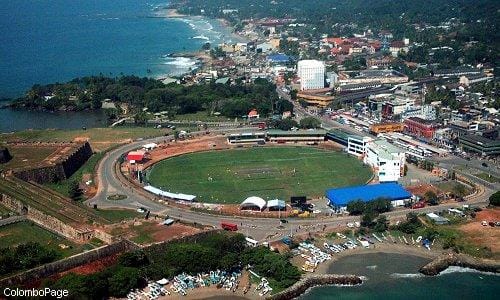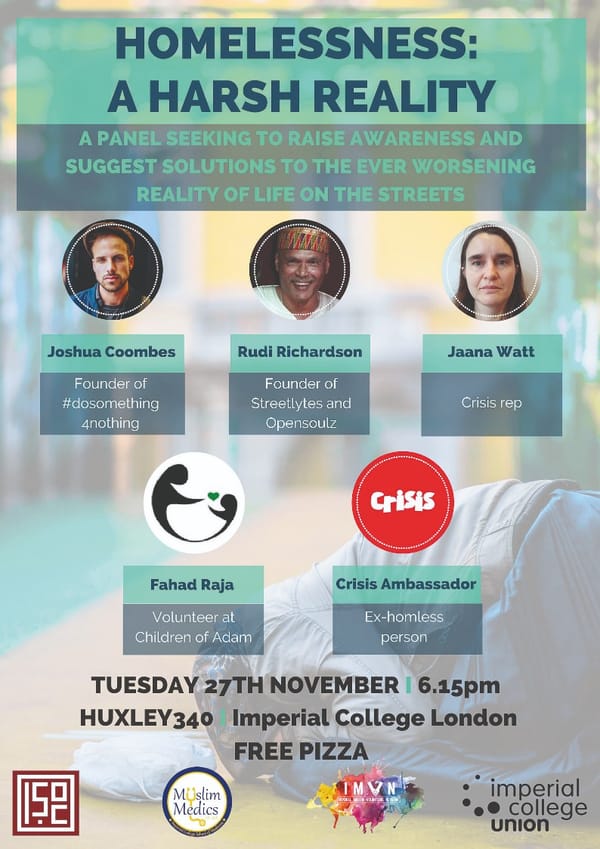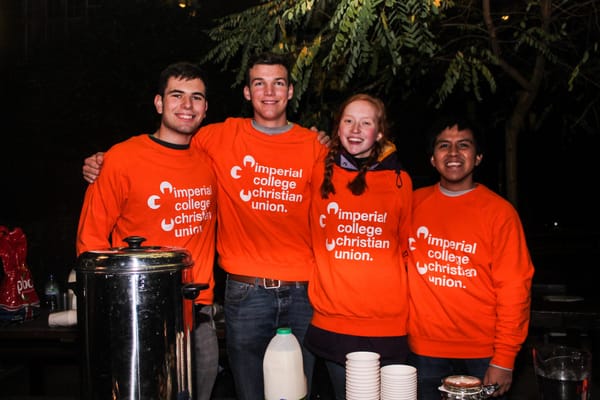Remembering the Boxing Day Tsunami
How chocolate biscuits saved my life.

December has always been a time of deep reflection for me. As the lights erupt and the Christmas spirit envelops the nation, it truly is a special time of the year. However, it makes me value the importance of family and the sanctity of life for a very different reason.
On Boxing Day 2004, the deadliest natural disaster in recent history wreaked havoc across South-East Asia, claiming the lives of 230,000 innocent people. As I approach my 23rd Christmas, midway through my 5th year of Medical School, contemplating career choices and planning New Year’s Parties, I pause for a moment to appreciate how phenomenally lucky I am to still be here today. On Boxing Day 2004, I was in Galle, Sri Lanka, one of the cities worst affected by the tsunami. This is my story.
Having moved from Sri Lanka to the UK in 2002, I had always enjoyed going back during the holidays to visit my family and friends. In 2004, my elder brother, my mum and I travelled to Sri Lanka for a 3-week holiday spanning Christmas and the New Year. My dad was tied down at work and had to stay home in Norwich.
On Boxing Day 2004, I was woken up at 6 am by my mum. We were in my uncle’s house in Colombo, the capital of Sri Lanka. Once I got through the initial confusion of being woken up so early, I was overcome with excitement. We had planned to go on a two-day trip to a coastal town on the south coast called Tissa. This meant pools, beaches and ball games – what more could an 8-year-old want? The travelling party consisted of my brother, mum, two cousins, aunt, uncle and myself.
We travelled along the south-west coast - world-famous for its golden beaches, exuberant marine life and surfing opportunities. I watched inquisitively as the fishermen brought in their morning’s catch – little did I realise that, for many of them, this would be their last day’s work. At around 9 am, we took a pit stop in Galle, one of the largest cities in the south of Sri Lanka. Galle is a bustling city embellished with a giant 16th century fort, overlooking the Galle International Cricket Stadium. We parked the van outside ‘Food City’, a supermarket much like Sainsbury’s or Tesco, as my mum wanted to get some snacks for the rest of the journey. Initially, my mum was going to go with my uncle, leaving me in the van with my brother and cousins. However, she then said something that, in hindsight, saved my life. She said, “Lasith are you coming? You can get some chocolate biscuits”. Being a somewhat rotund 8- year-old with an insatiable sweet tooth, this was an offer that I could not resist. I jumped out of the van and eagerly waddled up the stairs with my mum.
We entered the 2nd floor of the supermarket - only one thing was on my mind, ‘CHOCOLATE BISCUITS!’. I weaved in and out of the aisles like a hyperactive PacMan until I found my target. I was stood in front of the biscuits aisle, expertly perusing the range, when I heard my mum screaming. I ran towards my mum, who was stood in front of a large glass window, and I was shocked by what I saw. The city of Galle, was submerged in 15 feet of dark, violent sea water. Innocent people were being thrown around like rag dolls. Buses, cars and tuk-tuks were being flung into buildings, as if they were weightless toys. Amidst this chaos, I saw something even more terrifying. Our van, with the scrambling silhouettes of my brother, cousins and aunt inside, was being battered by the waves before being completely submerged.
At this point, the gravity of the situation became apparent. ‘This is serious, people are dying around me, my brother might die’ lapped through my head, each cycle exacerbating my hysteria. We watched, helplessly, as people tried to clamber up buildings to get to safety, only to be mercilessly swatted away by the waves. As time went on, the hysteria transformed into frank consideration of how my life would be without my brother – thoughts that are beyond the usual remit of an 8-year-old. ‘We will never play cricket together again, he’ll never see me go to university, I’ll never see him get married’ – each simulation of his absence making it progressively harder for me to breathe or think.

My uncle was in a particularly bad state. His entire family was in the water, unaccounted for. He made the courageous decision (arguably, his only option) to enter the water to search for his family. My mum and I remained in Food City, praying to Gods we didn’t routinely believe in, to perform a miracle on our behalf. I specifically remember bargaining with non-specific supernatural powers, explaining that I will strain every sinew for the rest of my life to make a positive difference to this world, if I could only have my brother back in return.
The city was enveloped in pain and misery - the cries of newly and reluctantly appointed widows, widowers and orphans, flooding every nook and cranny. A second and third wave had struck the city, deepening wounds and quashing hope. Then, 4 hours after the ordeal began, our prayers were answered. A soldier, who had been called to the city at this time of crisis, came to me and my mum, and told us that my brother was safe, and had been taken to the house of a local family on high ground. He was with my two cousins. My mum and I were overcome by an intense feeling of relief. All those piercing thoughts that were tormenting me will, thankfully, never enter the realm of reality. We were then escorted by the soldiers and reunited with my brother.
Once our emotions were finally under control, my brother told us of his experience. As the water started sweeping the van down the streets of Galle and the possibility of drowning became very real, my brother smashed the window and they all crawled out. At this point, the powerful torrents separated them. My brother got entangled underwater in a web of fallen telephone cables, causing a large laceration on his back. He managed to wriggle out only to be swept towards a canal running through the city. The canal was a particularly dangerous area – vehicles, rubble and people were being sucked in as if it were a black hole. If you were swept into the canal, that was it. My brother was pushed treacherously close, however, he managed to hoist himself onto a tree by the side of the canal. One of my cousins, similarly, grabbed onto a tree trunk whilst the other drifted close enough to my brother, such that he could pull her up onto the tree. Once the waters had calmed, they were taken to safety at a nearby church. My aunt had been swept over a kilometre before latching onto a fence and being taken to safety.
Rather unexpectedly, my uncle, who entered the water after the first wave had struck, was worst injured. He had badly cut his foot and lost a lot of blood. He was found unconscious and taken to a local doctor who managed to dress his wound and resuscitate him. In the evening, once the water had receded for the last time, we were taken by an army convoy to pick up my uncle and head back to Colombo. Thanks to the time difference, my dad was fast asleep whilst all of this unfolded. As he unassumingly switched on BBC news in the morning, he was met with ghastly images of apocalyptic destruction with mounting death tolls in South Asia. Fortunately, by the time he called us, we were all safe and sound. Reflecting upon this experience churns an eclectic collection of emotions. The intense feelings of potential loss that burdened me that day are juxtaposed by the elation that we survived against all odds. My mum and I had been in Food City for no more than 5 minutes before the tsunami struck. We were intending to be in there for no more than 5 minutes. Therefore, if the tsunami had struck 6 minutes earlier or 6 minutes later, our van may have been on the road in thick traffic, vulnerable to the mighty power of the sea. 6 minutes, and the outcome could have been very, very different.
Every December, I stop to think about the 230,000 lives that were lost and the many millions of lives that were irreparably destroyed that day. If not for a very fine margin, my family could have contributed to that total. As we live our pleasant lives in London we may complain about coursework, exams, relationships and all sorts – when the going is (relatively) easy we often find something (relatively) petty to pin our dissatisfaction on. It’s almost as if humans have an in-built dissatisfaction quota that must be fulfilled and it is often allocated to the least pleasing thing in our lives at the time. I’m not trying to undermine issues ‘lesser’ in magnitude than a natural disaster – these problems are, of course, of utmost importance to the individual who suffers them. However, every now and then, I feel it’s important to take a step back and be humbled by the fragility of human life, and appreciate how phenomenally fortunate we are to be alive and have the capability to make a positive difference to the world, no matter how big or small that may be. Enjoy your Christmas, embrace your family and friends, place your worries in the backseat for just a moment, and spend some time counting your blessings.






